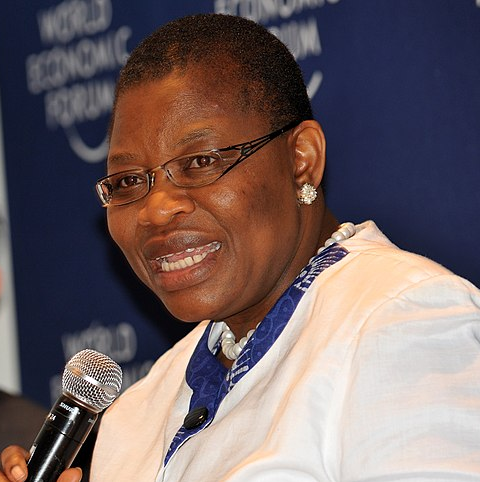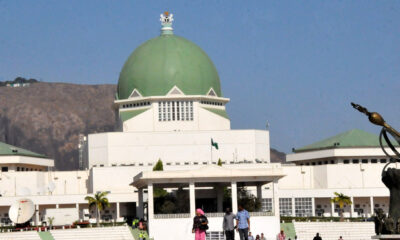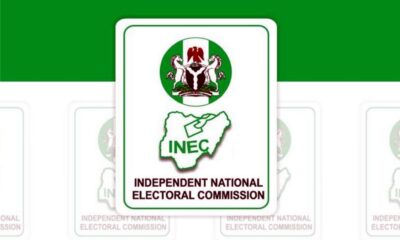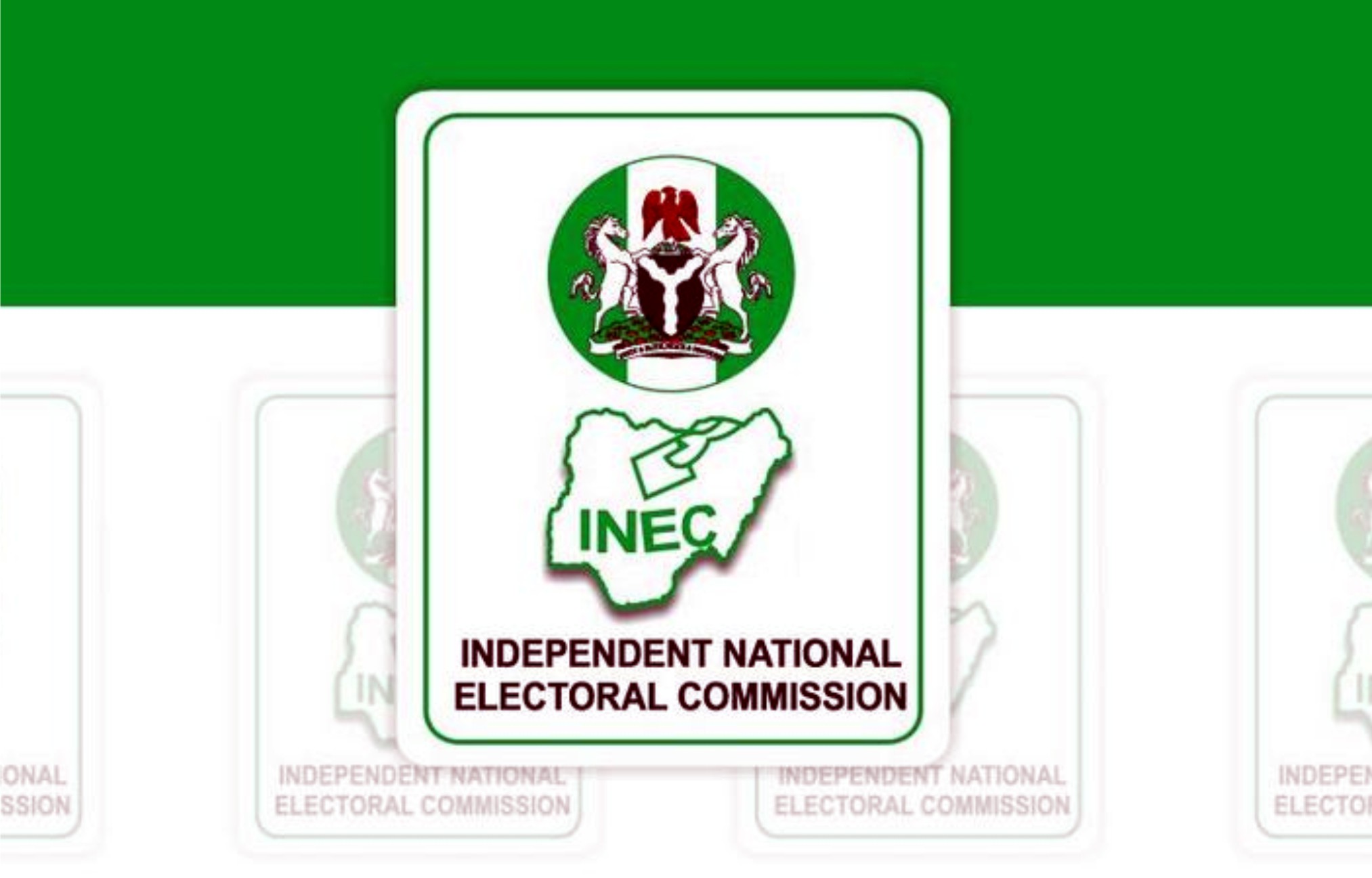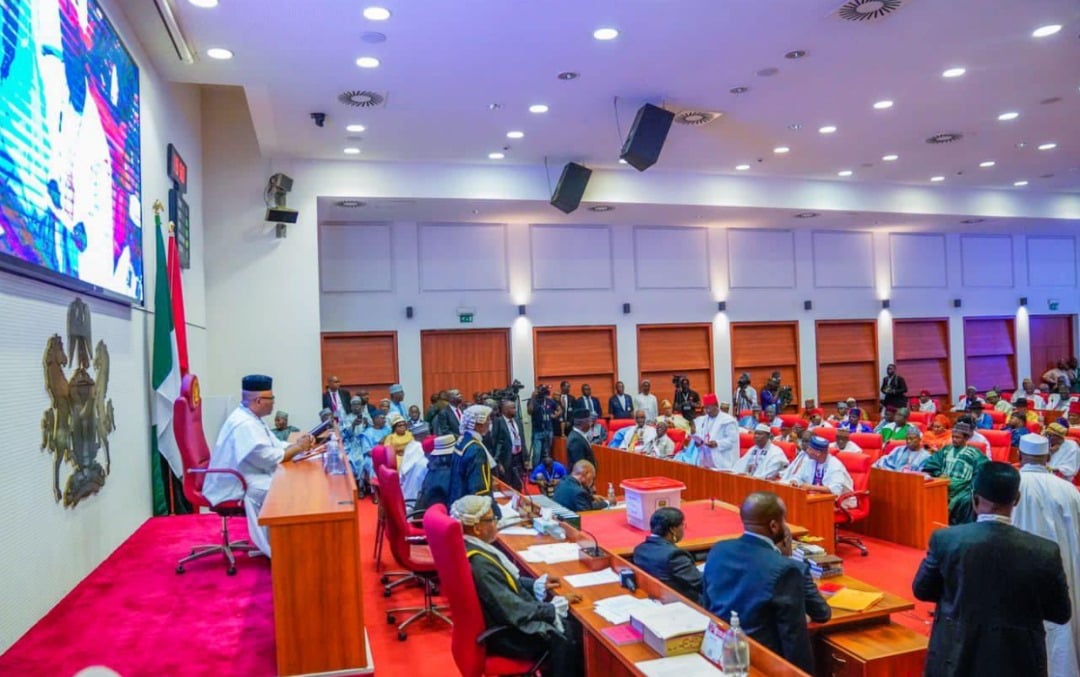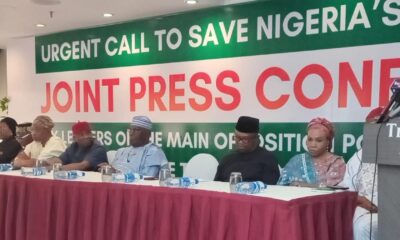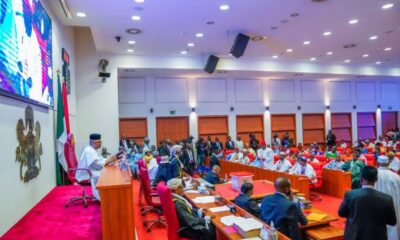Leaders of the opposition African Democratic Congress and the New Nigeria Peoples Party on Thursday mounted fresh pressure on the National Assembly demanding an immediate amendment of the Electoral Act 2026, which they described as anti-democratic and skewed ahead of the 2027 general elections.
The Senate, however, swiftly dismissed the agitation, advising opposition leaders Atiku Abubakar, Peter Obi and Rotimi Amaechi to pursue their concerns within the framework of the National Assembly.
Speaking at a press conference in Abuja, National Chairman of the New Nigeria Peoples Party, Ajuji Ahmed, said the contentious provisions must be expunged without delay.
Under the Electoral Act 2022, political parties were permitted to nominate candidates through direct primaries involving all registered members, indirect primaries conducted by delegates, or by consensus arrangements reached by party leaders.
However, the 2026 Electoral Act recently passed by the National Assembly and assented to by President Bola Tinubu on February 18 restricts parties to only direct primaries and consensus options.
In addition, the new law shortens campaign periods and timelines for primaries, while funding for the Independent National Electoral Commission will now be released six months before an election, instead of the previous 12 months.
Ahmed stated that opposition leaders viewed certain provisions of the Electoral Act 2026, which was signed into law by President Bola Tinubu last week, as a deliberate move by the ruling All Progressives Congress to undermine the will of the people ahead of the 2027 general elections.
Reading from a prepared text, he stated, “We therefore state unequivocally that the new Electoral Act is anti-democratic, and its implementation will undermine electoral transparency and the sanctity of the ballot, which are fundamental to free, fair, and credible elections and the bedrock of participatory democracy.
“The introduction of the proviso in Section 60(3), which allows wide and undefined discretionary powers to the presiding officer, overrides and negates the purpose of introducing electronic transmission of election results from polling units. This negation is unambiguously intended to provide a blank check to those who seek to manipulate election results by delaying the electronic transmission of results from the polling units to the IREV on the pretext of network failure.
“The premise of the proviso in Section 60(3) is the unavailability or possibility of network failure. We find this premise dubious and inconsistent with reality. The immediate past INEC Chairman, Prof. Mahmud Yakubu, stated on record that the BVAS equipment, which operates offline, had worked with over a 90 per cent success rate across the nation, and in the event of network failure at the point of transmission, the transmitted results would be delivered successfully whenever the network is available.
“This position has been further confirmed most recently by the former INEC Commissioner, Festus Okoye, as widely reported, that every polling unit in Nigeria has internet access. Indeed, these statements by those who have been in a position to know provide a counterfactual to the lies that are being fed to the Nigerian people by a government that has lost respect for reason and reality.”
The opposition leader further stated that the accounts of these two principal INEC officials were strongly corroborated by data available in the public domain.
Ahmed added, “According to the Nigerian Communications Commission, as of 2023, Nigeria had achieved more than 95per cent 2G coverage, which is more than sufficient for the transmission of election results from polling units.
“By that same period, Nigeria already had more than 159 million internet subscribers and more than 220 million telephone subscribers using the 2G network. It is also noteworthy that this capacity provides 24-hour coverage of the entire country. This goes to show that denying mandatory real-time transmission of election results from polling units on the basis of lack of communication network is not supported by evidence.
“Fortunately, millions of our people who transact business daily with various financial platforms, even from the remotest parts of the country, know that the no-network argument is fraudulent and is merely part of the APC game plan to rig the election in 2027.
“Indeed, we find it quite ironic that the same APC that strongly agitated for electronic voting only a few years ago is now opposed to the use of technology for the mere transmission of results. The game at hand is very clear.”
On party primaries, the opposition leaders stated that the amendment to Section 84 of the Act, which confines political parties to direct primaries and consensus in selecting candidates, amounts to an encroachment on the constitutionally guaranteed autonomy of parties in managing their internal affairs.
They further argued that the National Assembly could not rely on Section 228(b) of the Constitution as a basis to limit political parties to only two methods of nomination.
Ahmed stated, “There is nothing undemocratic about indirect primaries, which create an electoral college for the selection of candidates in an objective, transparent, and orderly manner.
“Our position, therefore, is that as political parties, we do not need legislation that prescribes which mode of party primaries political parties must adopt. In other words, the mode of nominating candidates should be strictly the internal affair of political parties.
“It is obvious that the objective of the APC government and their accomplices in the legislature is to provide the legal pretext for the corruption of the electoral system. They harbor neither plans nor intentions to conduct free and fair elections in 2027, because even in their arrogance and self-delusion, they are acutely aware of their growing unpopularity across the length and breadth of Nigeria, even with the recent gale of coerced and procured defections to their party.
“We demand that the National Assembly immediately commence a fresh amendment to the Electoral Act 2026 to remove all obnoxious provisions and ensure that the Act reflects only the will and aspiration of Nigerians for a free, fair, transparent, and credible electoral process in our country. Nothing short of this will be acceptable to Nigerians.”
Regarding the judiciary, opposition leaders stated that in recent years they have observed how the judiciary, which is supposed to safeguard democracy, has been used as a tool against it.
He stated, “The final arbiter in any democracy is the judiciary. It is therefore impossible to have real democracy without an independent and impartial judiciary. Unfortunately, we have witnessed in recent years how the very institution that is meant to protect democracy has been weaponised against democracy itself.
“We therefore wish to remind the judiciary that partisan politics is for the executive and the legislature, not the judiciary. The judiciary must stop being complicit in undermining our democracy. What we have witnessed in recent times represent strong evidence that our judiciary is in dire need of reform and the temple of justice is in need of deep cleansing.
“A situation where elections are blatantly rigged and those who participated in such criminality are quick to say ‘if you are not happy, go to court’ has done immeasurable damage to our democratic progress and it must be stopped. Electoral outcomes must be decided by the people, and not the courts. The judiciary must therefore re-discover its capacity for impartiality and neutrality and regain the intrinsic trust of citizens in its judgments.”
In his remarks, former 2023 APC presidential aspirant Rotimi Amaechi emphasised that the real challenge for the opposition was not President Tinubu, but the strategies employed by the opposition.
He stated, “Actually, Tinubu is not our problem; the opposition is the problem of the opposition. The first thing we must know is that we must separate ourselves from the government in power. I said in one of these conferences that when I was in government, (Muhammadu) Buhari wanted electoral reform. So, a few ministers went to him and convinced him not to sign — that if he signed, Russia would hack the system and impose the wrong President on us. And he refused to sign.
“Tinubu will one day shout electoral reforms. If he doesn’t shout electoral reforms, those who are supporting him will shout electoral reforms. Tinubu is not our problem, watch his government, watch his strategy to win elections. His strategy is simple; his pattern is simple. He tries something today, you are weak. He puts something bigger, you are weaker. So, we need to focus on our strategy.”
Additionally, the 2023 Labour Party presidential candidate, Peter Obi, lamented the rising poverty rate, noting that the APC-led Federal Government had borrowed heavily without delivering any tangible results.
He stated, “We have the same view, but it is important that we repeat it as often as we can so that Nigerians know we are together. There is a need for a genuine opposition party. Those who are not here today — we are pleading that we all come together to save our dear country.
“The government we have today and that continues is the worst ever in our country. There is no governance in Nigeria. The legislature is at its worst. The judiciary is no longer the hope of the weak or the poor. Insecurity, killings, and abductions are worse than even in countries at war. Just in the past week, I mentioned killings in Zamfara on Friday, and today, even while we are speaking, over 20 already (killed) in Adamawa. It is all about the country; I just mentioned a few.
“Poverty has increased dramatically in the past two and a half years — from about 87 million to about 140 million today, the highest in any country on earth. In fact, we now have almost over 30 per cent of the world’s poor people living in Nigeria. We now have more poor people living in Nigeria, a country of about 240 million, than China and India combined.
“This government has borrowed more, according to records, than all governments since 1999, without anything to show for it. Food prices have not gone down. Actually, we have killed all our farmers because we have imported cheap goods and thrown our farmers into poverty, which will even worsen the hunger situation in Nigeria in the future.
“Manufacturers’ houses and warehouses are full without anything to show for it. So, we have a crisis, and everybody has to come together to save the country.”
On his part, former Vice-President Atiku Abubakar urged that the opposition leaders’ position on the electoral process be submitted to all foreign embassies.
Atiku stated, “And again, what you must bear in mind is that the collapse of democracy in Nigeria is going to lead to the collapse of democracy in Africa because we are the largest democracy in Africa. These are some of the consequences that will definitely affect other democracies in Africa.
“So, I will call on other opposition parties that are not here to make sure that they are part of this movement for the unity of opposition parties to ensure we restore our democracy.
But a word of caution: we did this exercise in 2014 also. We came together and fought in this city because we felt democracy was faulty in 2014, only for us to end up in the same position we found ourselves in. The major challenges were insecurity, the economy, and so on and so forth. Now it is really worse.
“So, we must bear it in mind that we must make sure we restore true democracy to our country. That was what we fought for. That was what the founders of this country fought for, and what we fought for in the military. We must make sure that it is established in this country.”
Opposition leaders in attendance include National Chairman of the African Democratic Congress, David Mark, and chieftain of the NNPP, Buba Galadima.
Also present at the Lagos/Osun Hall of Transcorp, Abuja, were the ADC National Secretary, Rauf Aregbesola, and the party’s National Publicity Secretary, Bolaji Abdullahi, among other stakeholders.
Others include Senator Dino Melaye, former ADC National Chairman, Ralph Nwosu, and former Cross River State Governor Liyel Imoke, among others.
Senate reacts
Meanwhile, the Senate on Thursday urged the opposition to channel their concerns through members of the National Assembly rather than heighten political tensions.
Senate spokesman, Senator Yemi Adaramodu, dismissed the agitation for another review of the law, likening it to a belated action taken after due process had been concluded.
“Electoral Act again? Do you abort a pregnancy after the naming ceremony? But no problem. If they (opposition leaders) have any grey areas, they can just make their personal proposals to their legislators and they will bring them.
“Once they bring it to the National Assembly, we will look at it,” he said.
Also weighing in, Chairman of the Senate Committee on South-East Development Commission, Senator Orji Uzor Kalu, maintained that the power to amend the Electoral Act rested with the National Assembly and not with individuals or pressure groups.
“Review which Electoral Act? Something that Mr President has assented to? No, it is the decision of the National Assembly to make, not an individual thing,” Kalu stated.
He cautioned opposition figures against what he described as “inflammatory rhetoric” capable of destabilising the polity.
“The opposition should stop heating up the polity. The route they are taking is not the right one. They should leave this route because it can only lead to chaos.
“If they are not comfortable with the current administration, they should change it by contesting against Mr President in 2027 and see if they can defeat him. In the meantime, they should stop heating up the polity,” he added.
The latest exchange underscores rising political tensions as parties begin early manoeuvres ahead of the 2027 general elections.
While the opposition is pressing for a review of the electoral framework to ensure transparency and fairness, the Senate leadership maintains that any amendments must follow constitutional procedures and be initiated formally within the legislature.
With both sides digging in, the debate over the Electoral Act is shaping up to become a defining issue in Nigeria’s pre-2027 political landscape.
punch.ng
FOLLOW US ON:
FACEBOOK
TWITTER
PINTEREST
TIKTOK
YOUTUBE
LINKEDIN
TUMBLR
INSTAGRAM

